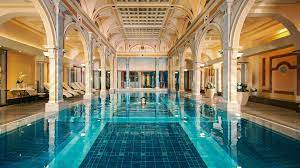This article focuses on how luxury hotels are adapting to meet changing consumer preferences. With the rise of technology and changing consumer behavior, luxury hotels have had to adjust their offerings to cater to new and evolving customer needs. This article will explore the changes that luxury hotels are making to ensure they remain competitive in the market and attract and retain guests.
Luxury hotels have always been known for their exceptional service, elegant decor, and top-notch amenities. However, as the world has become more interconnected, and consumer preferences have changed, luxury hotels have had to adapt to keep up.
With the rise of technology and changing consumer behavior, luxury hotels have had to adjust their offerings to cater to new and evolving customer needs. This article will explore the changes that luxury hotels are making to ensure they remain competitive in the market and attract and retain guests.
Personalization

Luxury hotels are increasingly focusing on personalization. Guests want to feel valued and appreciated, and luxury hotels are meeting this need by offering personalized experiences. This includes everything from customized meals to tailored spa treatments. Luxury hotels are also using technology to personalize the guest experience, such as allowing guests to use their mobile devices to check in and access their rooms.
Sustainability
Sustainability is becoming increasingly important to luxury hotel guests. As consumers become more environmentally conscious, they are looking for hotels that share their values. Luxury hotels are responding by implementing sustainable practices, such as using renewable energy sources and reducing waste. Many luxury hotels are also partnering with local organizations to support sustainability initiatives in their communities.
Technology
Technology is playing a significant role in how luxury hotels are adapting to meet changing consumer preferences. Guests want to stay connected, and luxury hotels are meeting this need by providing high-speed internet access and smart TVs in rooms. Many luxury hotels are also using technology to streamline processes, such as allowing guests to use their mobile devices to check-in and access their rooms.
Wellness
Wellness is a growing trend in the hospitality industry, and luxury hotels are no exception. Guests are looking for ways to improve their physical and mental health while on vacation, and luxury hotels are offering a range of wellness amenities, such as fitness centers, yoga classes, and meditation sessions. Some luxury hotels are even offering wellness retreats, where guests can focus on their well-being in a tranquil setting.
Local Experiences
Luxury hotels are increasingly focusing on providing guests with local experiences. Many guests are looking to immerse themselves in the local culture and explore the surrounding area. Luxury hotels are responding by offering tours of local landmarks, partnering with local restaurants to offer authentic cuisine, and providing local guides to help guests explore the area.
Dining
Dining is a significant aspect of the luxury hotel experience, and hotels are adapting to meet changing consumer preferences in this area. Guests are looking for more than just fine dining options; they want a variety of food choices and the flexibility to dine when and where they choose. Luxury hotels are responding by offering a range of dining options, including casual cafes, outdoor dining, and room service.
Social Media
Social media has become an essential part of how consumers make purchasing decisions. Luxury hotels are responding by creating a strong social media presence and engaging with their guests online. They are also using social media to showcase their personalized experiences, local experiences, and sustainability initiatives.
Concierge Services
Concierge services have always been an essential part of the luxury hotel experience, but hotels are now taking this to the next level. Guests want personalized recommendations for things to do and see in the area, and luxury hotels are responding by providing highly trained concierge staff who can provide customized recommendations and experiences.
Flexible Booking Policies
Flexible booking policies have become increasingly important to guests, especially in light of the COVID-19 pandemic. Luxury hotels are responding by offering more flexible cancellation and rescheduling policies, which allow guests to change their plans without penalty. This gives guests peace of mind and helps them feel more comfortable making travel plans.
Safety and Security
In addition to flexible booking policies, safety, and security have become a top priority for luxury hotels. Guests want to feel safe and secure during their stay, and hotels are taking steps to ensure this. This includes implementing contactless check-in and check-out, increasing cleaning and disinfecting protocols, and providing hand sanitizer throughout the hotel.
Luxury Amenities
Luxury hotels are known for their high-end amenities, and hotels are continuing to invest in these to meet changing consumer preferences. This includes everything from luxurious bedding and bath products to high-end fitness equipment and spa treatments. Luxury hotels are also investing in technology to enhance the guest experience, such as smart mirrors and voice-activated assistants.
Environmental Sustainability
Luxury hotels are taking environmental sustainability to the next level by incorporating green practices into their operations. This includes everything from using energy-efficient lighting and appliances to reducing water usage and waste. Some luxury hotels are even implementing green roofs and using recycled materials in their construction.
Inclusivity

Luxury hotels are also focusing on inclusivity to meet changing consumer preferences. This includes providing accessible accommodations for guests with disabilities, as well as offering diverse food options and catering to a range of dietary restrictions. Luxury hotels are also taking steps to create a welcoming environment for guests of all backgrounds and cultures.
Conclusion
Luxury hotels are adapting to meet changing consumer preferences in a variety of ways, from personalization and sustainability to technology and wellness. By listening to their guests and investing in new and innovative offerings, luxury hotels are ensuring they remain competitive in the market and attract and retain guests. As consumer preferences continue to evolve, luxury hotels will need to remain flexible and adapt to meet the changing needs of their guests.


























